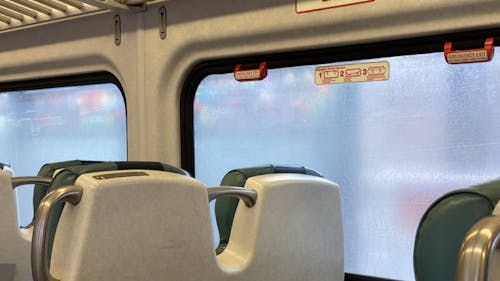U. professors team up with NJ Transit to fix hazy train windows

New Jersey Transit (NJ Transit) requested the Rutgers Center for Advanced Infrastructure and Transportation (CAIT) to help find a solution to hazy windows on NJ Transit trains, according to an article from NorthJersey.com.
Hazy windows have impacted NJ Transit's newest trains, which were built between 2006 and 2012. The opaque windows aboard the multilevel rail cars make it difficult for riders to locate their stops, especially if they have trouble hearing the train's announcer.
Ali Maher, the director of Rutgers CAIT and a professor in the Department of Civil & Environmental Engineering, said the New Jersey Department of Transportation contracted his research team to study the issue. While window haze may not pose significant dangers, Maher said it does impact the riders' commuting experience.
"It's just not pleasant when you are sitting in the train, and you cannot see outside. Part of riding a train, and the experience you want to have, is to be able to sit, relax and observe the view," he said.
Ashutosh Goel, an associate professor in the Department of Materials Science and Engineering and a researcher studying the issue, said the research team obtained new and used windows from NJ Transit to analyze.
His team used various chemical measurements on the surface of the windows, including infrared spectroscopy, X-ray photoelectron spectroscopy and electron microscopy. Goel said the principal investigation found that the source of the haze was the deterioration of a protective layer on the windows.
"We have discovered that a thin (a few micrometers thick) coating covers the surface of the window to protect it from scratches. The coating has degraded over time, thus, resulting in scattering of light leading to opacity," he said.
Goel said that environmental factors such as drastic seasonal temperature changes, sunlight and dust contributed to the degradation of the coating, in addition to the daily use of trains by passengers and workers.
NJ Transit was prepared to spend $8 million on replacing hazy windows in 429 train cars before contacting Rutgers CAIT to find a solution. The team is now focused on finding a cost-effective way to repair the windows instead of replacing them, according to the article.
"The next step for us is to see if it is possible, at all, to remove that coating and recoat the glasses … we have identified the root of the problem, and the focus of the program right now is to find a remedy for it," Maher said.
Researchers found several possible solutions and decided to develop a safe chemical wash that would be easier to administer.
This investigation is part of a continued partnership between the University and NJ Transit, including a 2020 study on sanitizing buses and an agreement earlier this month to establish the first regional training center for the International Association of Public Transport. For the University's research on the hazy windows, NJ Transit is paying Rutgers $43,000, according to the article.
Maher said the research team hopes to end its investigation and research by the end of this summer and administer the proper solution.
"(Hazy windows) impact the comfort of the passengers, and it also impacts the perception of riding trains," he said.



